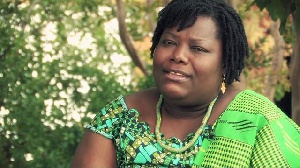Minister of Gender, Children and Social Protection, Nana Oye Lithur, on Wednesday said the powerful positions that women were occupying in recent times are not meant to vilify men.
She said it is rather meant to help identify the needs of both gender and to promote equality and national development.
Nana Oye Lithur said women’s influential positions were to enable them to make positive impacts in the lives of women and children and the society at large.
The minister was speaking at a meeting with female High Commissioners and Ambassadors in Ghana, at her office in Accra, to interact, share experiences, ideas and to encourage one another in the promotion of gender equality and women’s rights.
Among the dignitaries were the High Commissioners of Spain, Italy, Brazil, Canada, Germany, South Africa, Zimbabwe, Ethiopia, Niger, DR Congo and Morocco.
Other members of UN Systems, some female cabinet ministers and some deputy ministers were also at the meeting to interact with the Ambassadors.
Mrs Lithur said women are key development agents and every nation that desires sustainable development must ensure that women’s needs were adequately brought to the fore and addressed, in order to have them on board the sustainable development agenda.
She said women all over the world had shown that they were not weak as presumed and that they had successfully held key positions in both the private and public sector, including the presidency.
She emphasized that the history of women being seen as only capable in domestic settings had been rewritten.
She said for instance, the world could boast of 29 female heads of states, including Angela Merkel of Germany, and Ellen Johnson Sirleaf of Liberia and that female representation in Parliament across the globe continue to show remarkable growth.
The minister, however, said although Ghana could only boast of 10.9 per cent of Women Parliamentarians, government was on course to increase women’s participation in politics and decision making.
She said currently women hold most of the higher positions in public institutions, adding that efforts were being made to ensure the appointment of more women to achieve the 40 per cent quota promised in the ‘Better Ghana Agenda’.
Pavelyn Tendai Musaka, Zimbabwean High Commissioner, said gender mainstreaming was on course and that she used to be the only female Ambassador among the 22 African Ambassadors in Ghana in 2005. “But now there are many female African Ambassadors and a lot more European High Commissioners representing their respective countries”.
She said the meeting with the gender minister afforded them the opportunity to interact and cooperate in promoting gender issues.
Charlotte Osei, Chairperson of National Commission on Civic Education, said being described as a feminist was not a bad tag as feminism connotes working and giving women their deserving places in life.
Regional News of Thursday, 23 May 2013
Source: GNA

















